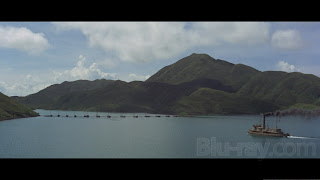 The name Boris Karloff surely brings to mind for most people his iconic role as Frankenstein's monster in director James Whale's 1931 classic horror film, but Karloff starred in plenty of memorable features in the genre. His John Grey is far different from the sympathetic creature concocted in Frankenstein's lab. Grey is a loathsome fellow, completely lacking in conscience. He delights in mentally torturing a former colleague who has risen in society, and is fully capable of murder.
The name Boris Karloff surely brings to mind for most people his iconic role as Frankenstein's monster in director James Whale's 1931 classic horror film, but Karloff starred in plenty of memorable features in the genre. His John Grey is far different from the sympathetic creature concocted in Frankenstein's lab. Grey is a loathsome fellow, completely lacking in conscience. He delights in mentally torturing a former colleague who has risen in society, and is fully capable of murder. Karloff gives a chilling performance, superb as he handles the despicable nature of the character, grinning conspiratorially as he holds MacFarlane's past over his head--the doctor calls him a malignant cancer--or when winking at the new assistant as he makes his first delivery. Watch his face change when later confronted by another of the doctor's assistants, Joseph, (Bela Lugosi in a throw-away part), who comes to Grey's apartment with blackmail in mind. Karloff conveys curiosity, seemingly amiable, but once he understands what the fellow is up to, his face takes on a sinister and serious look. You can see him planning the man's demise. And in a delightful precursor to a James Bond villain, SPECTER's Blofeld, Grey lovingly strokes a cat, an as out-of-character gesture as one can imagine from a ghoul.
The film is based on an 1884 short story by Robert Louis Stevenson, which drew its inspiration from real events, the notorious Burke and Hare murders, serial murders that took place in Edinburgh in 1827. William Burke and William Hare sold corpses of their murder victims to Doctor Robert Knox for use as dissection material for his medical students. Eventually discovered and brought to trial, Hare turned on his partner. Protected by immunity, Hare's testimony sent Burke to the gallows. Knox and Hare went free. The film alludes to the case, and it is Grey and MacFarlane's unspecified involvement with the incident that ties the two together.
One of producer Val Lewton's psychological horror films, 1940s B-pictures made quickly and on a tight budget, The Body Snatcher is better than the best known of that lot, Cat People. Like that film, its effective score was written by Roy Webb, whose eerie music works wonderfully to set the mood.
It may come as a surprise to some viewers that Robert Wise served as director. Best known for his 1960s work on commercial big-budget films such as West Side Story, The Sound of Music, and The Sand Pebbles, Wise first found success as an editor in the 1940s, most notably with Citizen Kane. But he soon moved to the director's chair. Among his 1940s credits are two terrific noirs: Born to Kill and The Setup.
Wise's skill as an editor is on display here when he mixes alternating POV closeups in one of the film's best scenes--the first meeting in a tavern by MacFarlane and Grey. The doctor and Fettes come in for a drink. Grey, looking sinister sits alone at a corner table and summons them over. The doctor relents with reluctance, clearly repelled by the man. He and Grey exchange an odd conversation, and Fettes is left wondering what is the connection between these such different men.
 |
| Grey and MacFarlane (Henry Daniell) - a sordid partnership. |
Cabman Grey: "I am a small man, a humble man. Being poor I have had to do much that I did not want to do. But so long as the great Dr McFarlane comes to my whistle, that long am I a man. If I have not that then I have nothing. Then I am only a cabman and a grave robber. You'll never get rid of me, Toddy."Wise also makes good use of silhouettes and shadows during some of the scenes of violence to engage the viewer's imagination. Thankfully, one such moment includes Grey's nasty bludgeoning of a poor dog that loyally guards the grave of its master. Another involves Grey following a waif-like balladeer down a dark alley. Wise sets this up immediately prior with a terrific slow pull in of the camera to Karloff, watching the girl pass by his door. You hear the girl sing and the sound of the horse's hooves on the cobblestones, and watch her and Grey's cab disappear into the dark. Suddenly the girl's song is cut short.
Eventually, there is a fateful encounter between the two protagonists. Faithful to the source story, the film's climax is a spectacularly wild coach ride in a rainstorm, MacFarlane on one side of the seat, Fettes on the other. In between sits a bagged corpse of a recently deceased woman they dug up from a graveyard. MacFarlane begins to hear a strange but familiar voice. Stopping the vehicle, he calls for Fettes to step down and bring him a lantern. He uncovers a potion of the bag and gets the shock of his life. Madness has taken over.
 |
| Grey makes a ghastly delivery. |






